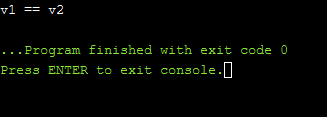3-way comparison operator (Space Ship Operator) in C++ 20
Last Updated :
02 Nov, 2023
The three-way comparison operator “<=>” is called a spaceship operator. The spaceship operator determines for two objects A and B whether A < B, A = B, or A > B. The spaceship operator or the compiler can auto-generate it for us. Also, a three-way comparison is a function that will give the entire relationship in one query. Traditionally, strcmp() is such a function. Given two strings it will return an integer where,
- < 0 means the first string is less
- == 0 if both are equal
- > 0 if the first string is greater.
It can give one of the three results, hence it’s a three-way comparison.
| |
Equality |
Ordering |
| Primary |
== |
<=> |
| Secondary |
!= |
<, >, <=, >= |
From the above table, it can be seen that the spaceship operator is a primary operator i.e., it can be reversed and corresponding secondary operators can be written in terms of it.
(A <=> B) < 0 is true if A < B
(A <=> B) > 0 is true if A > B
(A <=> B) == 0 is true if A and B are equal/equivalent.
Program 1:
Below is the implementation of the three-way comparison operator for two float variables:
C++
#include <compare>
#include <iostream>
using namespace std;
int main()
{
int x = 10;
int y = 20;
auto res = x <=> y;
if (res < 0)
cout << "Less";
else if (res > 0)
cout << "Greater";
else if (res == 0)
cout << "Same";
else
cout << "Unordered";
return 0;
}
|
Output
Program 2:
Below is the implementation of the three-way comparison operator for two vectors:
C++
#include <bits/stdc++.h>
using namespace std;
int main()
{
vector<int> v1{ 3, 6, 9 };
vector<int> v2{ 3, 6, 9 };
auto ans2 = v1 <=> v2;
if (ans2 < 0) {
cout << "v1 < v2" << endl;
}
else if (ans2 == 0) {
cout << "v1 == v2" << endl;
}
else if (ans2 > 0) {
cout << "v1 > v2" << endl;
}
return 0;
}
|
Output

Note: You should download the adequate latest compiler to run C++ 20.
Needs of Spaceship Operators:
- It’s the common generalization of all other comparison operators (for totally-ordered domains): >, >=, ==, <=, <. Using <=>, every operation can be implemented in a completely generic way in the case of user-defined data type like a structure where one has to define the other 6 comparison operators one by one instead.
- For strings, it’s equivalent to the old strcmp() function of the C standard library. So it is useful for lexicographic order checks, such as data in vectors, or lists, or other ordered containers.
Like Article
Suggest improvement
Share your thoughts in the comments
Please Login to comment...